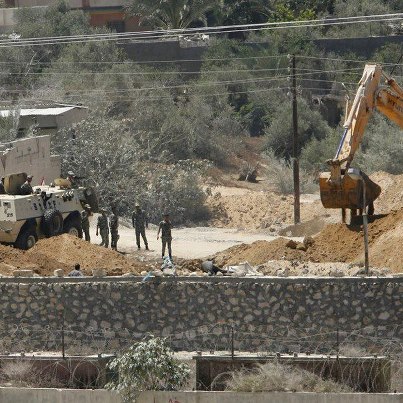Latest NEWS
- Aswat Masriya, the last word
- Roundup of Egypt's press headlines on March 15, 2017
- Roundup of Egypt's press headlines on March 14, 2017
- Former Egyptian President Hosni Mubarak to be released: lawyer
- Roundup of Egypt's press headlines on March 13, 2017
- Egypt's capital set to grow by half a million in 2017
- Egypt's wheat reserves to double with start of harvest -supply min
- Roundup of Egypt's press headlines on March 12, 2017
Elections Snapshot: low turnout expected in Egypt's beleaguered North Sinai

(Archive) Army forces supervise the process of demolishing tunnels in North Sinai - Aswat Masriya
CAIRO, Nov. 13 (Aswat Masriya) – Residents of the troubled province of North Sinai are expected to head to the polls on Nov. 22-23 to vote for their representatives in parliament, despite an escalating insurgency that has left the militant hotbed almost a ghost town.
Since the ouster of former president Mohamed Mursi in 2013, insurgents in North Sinai have stepped up attacks on security personnel, government buildings and even civilians, leading to violent retaliation by the Egyptian military.
A report by Human Rights Watch (HRW) released in September 2015 said that the Egyptian government's destruction of thousands of buildings in the Rafah border area to "counter the threat of smuggling tunnels was likely disproportionate," citing "large scale demolitions" in the border that began in July 2013.
At least 3,255 homes were destroyed, said HRW in "Looking for Another Homeland," a report based on interviews with members of 11 evicted families, as well as activists and journalists. The displaced residents were "often told to pack up their lives and leave within 48 hours," the report said, contradicting the Egyptian Cabinet's claims that "all measures were taken in consultation and coordination with local residents."

But despite the unstable security situation and the year-long state of emergency and nightly curfew in the region, clashes have been intensifying prompting even more residents to leave their homes in flashpoint towns like Sheikh Zuweid, Rafah and increasingly Arish to move to other governorates.
Civilian deaths are frequent, either at the hands of militants for alleged “collaboration with the army” or in the crossfire between security forces and militants. It is impossible to gauge exactly how many civilians have lost their lives in the restive area because access to journalists is severely restricted and recent anti-terrorism legislation imposes heavy fines on news outlets that contradict official army statements and death tolls.
Elections in a glance
Despite the dire security situation, a total of 37 individual candidates are slated to compete over five individual seats in four constituencies. Only one list has fielded candidates for the single seat allocated to the party list system, For the Love of Egypt, the brainchild of ex-military intelligence general Sameh Seif al-Yazal.
The number of candidates is a noticeable decline by at least 50 percent compared to previous elections due to security conditions or candidates' fear of being associated with the Mubarak regime.
Only one female candidate, Amal Madi, is running in North Sinai agaisnt three men for the Sheikh Zuweid and Rafah seat, where most voters have fled to escape the military crackdown on the insurgency.
Election campaigns
Like everything else, the security conditions have taken their toll on candidates' ability to campaign.
One Arish resident named Ahmed Mahmoud told Aswat Masriya that, compared to previous elections, campaigning is almost non-existent.
Mahmoud pointed to the “indifference” by families and tribes, who previously fought their way “to achieve glory by winning a seat in parliament."
In the towns of Rafah and Sheikh Zuweid, the situation is worse. Mostafa Singer, a teacher living in Sheikh Zuweid, says the security conditions will “definitely” affect the electoral process, as the number of potential voters is in decline due to the relocation of many residents to Arish and Beir al-Abd from Rafah and Sheikh Zuweid to avoid clashes between security and militants.
Naser Adam an employee living in Arish concurred that there is a pervasive sense of apathy and that voters are using the security conditions as “pretext” to skip the polls. Adam expected the turnout to be between 15-20 percent, unlike previous elections which witnessed almost 35 percent turnout.
Sheikh al-Touny Salem Mubarak from Beir al-Abd, however, argued that the situation in Beir al-Abd constituency is different because “it’s calmer and the security conditions are semi-stable," which might lead to a turnout exceeding 35 percent.
Voter turnout in phase one of the parliamentary elections which saw 14 provinces go to the polls, was 26.56 percent on the first round and just over 21 percent in the second round.










